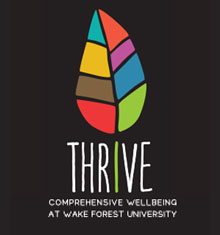She sat cross-legged on the floor, her arm unconsciously crossing her chest in a protective gesture, massaging her right shoulder.
The setting sun reflected off of Wait Chapel through the window as she began to tell her story of anxiety and depression.
Senior Sydney Whitcomb’s depression began in high school. At the time, she did not seek help because she was unable to communicate or even understand why she was depressed.
In the spring of 2015, during her sophomore year at Wake Forest, Whitcomb experienced the death of a close friend from suicide. This was the tipping point, causing her mental health to slip further from her control. Yet, she still did not seek the help she needed.
“I had a stigma,” Whitcomb said, “I didn’t want people to think that I was depressed to gain attention.”
Nearly one in every five adults, or 42.4 million Americans, has a diagnosable mental health condition. The Thrive initiative at Wake Forest works to promote awareness and eliminate the stigma surrounding mental health.
This week’s Signs of Stress campaign teaches the Wake Forest community about recognizing signs of emotional suffering in others and yourself. Hoping to encourage students, such as Whitcomb, to reach out.
“The Signs of Stress campaign is an opportunity for us to promote and normalize that people do experience emotional stress” said Malika Roman Isler, Director of Wellbeing.
Daily mental health screenings for anxiety and depression were held this week on Manchester Plaza. On other days there was also an inflatable slide, art therapy, a petting zoo and massages. All activities were aimed at stress relief.
Several students expressed that although they know mental health is important, they would not want to participate out of fear that even taking a screening indicated that something was wrong with their mental health.
Freshman Christina Scott said that even though the screening on a healthy student took about three minutes in total, was conveniently located and offered free ice cream as an incentive, her first reaction was not to participate.
Part of eliminating the stigma is “making people aware that you don’t need a reason for having a mental illness. It isn’t something you choose,” Whitcomb said.
About a month after the death of Whitcomb’s friend in 2015, she sought help at the University Counseling Center. She described that this was the first time she was able to completely open up to anyone. Previously, her friends didn’t know how to handle the situation and often made her feel like a burden.
Since Thrive began in September of 2014, the university reported a greater access to the Counseling Center as well as an increase in people participating in mindfulness training.
“We have a much greater awareness about ways to deal with stress proactively as well as ways to eliminate stress once people are feeling it” Isler said.
According to the National Alliance on Mental Illness, 40 percent of students across the country with diagnosable mental health conditions did not seek help.
Whitcomb explained that mindfulness programs, like Thrive, were not present during her freshman year at Wake Forest. Since their creation, she has seen more of her friends recognize and seek help for their own issues with anxiety and depression.
A goal of Thrive and the Office of Wellbeing is ensuring that students, faculty and staff have the tools and resources to navigate life appropriately.
The use of campus resources for mental health and wellbeing are readily promoted. Students have access to resources and information on how to help friends experiencing mental health issues.
Two years after her friend’s death, Whitcomb continues to struggle intermittently with depression and feelings of guilt.
Whitcomb calls for a community understanding that having a mental illness is not a choice. Tools, like counseling, are for everyone, not just those with a diagnosable condition.
“Thrive is for the whole Deacon community,” Isler said. “We are all responsible for taking care of each other.”














HaroldAMaio • Oct 28, 2016 at 11:07 am
—-eliminate the stigma surrounding mental health
That is very good advice: Eliminate it from your mind and your paper. (And from your university.)
Harold A. Maio, retired mental health editor